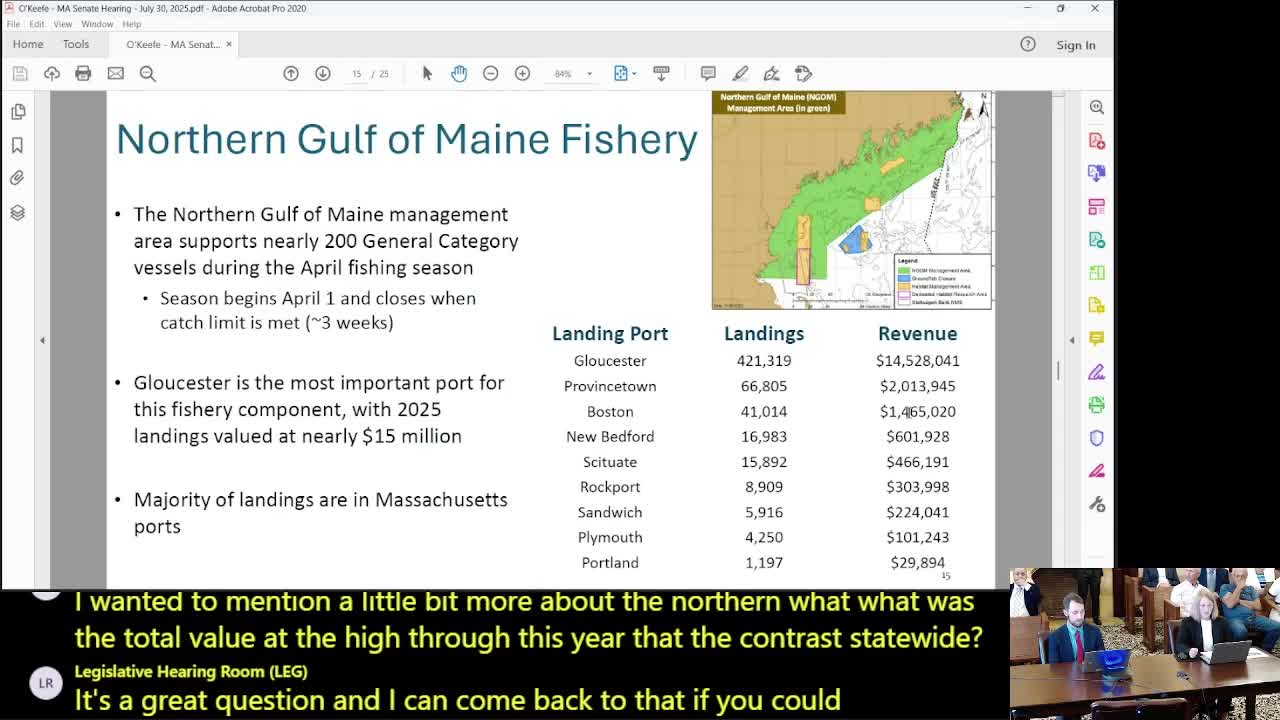New England Council Proposes Scallop Strategic Plan to Sustain Gulf Of Maine Fishery
July 30, 2025 | 2025 Legislature MA, Massachusetts
This article was created by AI summarizing key points discussed. AI makes mistakes, so for full details and context, please refer to the video of the full meeting. Please report any errors so we can fix them. Report an error »

The Massachusetts Senate Committee on Post Audit and Oversight recently convened to discuss critical developments in the Northern Gulf of Maine scallop fishery, a vital economic driver for the state. With Gloucester as the primary port, the fishery generates approximately $15 million in revenue during a brief three-week fishing season each April, highlighting its significance to local communities.
The meeting revealed that while the abundance of scallops has increased, the overall biomass has decreased due to a significant portion of the population being too small for harvesting. This presents challenges for the upcoming fishing years, but it also signals a potential recovery in the resource, which could lead to increased revenue in the future. The projected revenue for the entire fishery in 2025 is estimated at $350 million.
The committee also discussed ongoing management measures under Scallop Framework 39, which will guide operations through March 2026. These measures include allocations for limited access vessels and a quota for the general category fleet, ensuring sustainable practices while balancing economic needs.
A key focus of the meeting was the New England Council's scallop strategic plan, aimed at defining a vision for the fishery over the next three to five years. Public input has been gathered to address pressing issues, including expanding fishing opportunities in the Northern Gulf of Maine and improving management practices.
One contentious topic was the potential for permit consolidation in the scallop fishery. This would allow vessels to carry multiple permits, potentially increasing efficiency but also raising concerns about limiting access for new entrants. The council has yet to take definitive action on this matter, reflecting the ongoing debate within the industry about financial sustainability and participation.
As environmental conditions continue to evolve, the committee emphasized the importance of collaborative research and management to ensure the long-term viability of the scallop fishery. The discussions underscored the need for adaptive strategies to navigate the challenges posed by climate change and shifting marine ecosystems, ensuring that this lucrative resource remains a cornerstone of Massachusetts' coastal economy.
The meeting revealed that while the abundance of scallops has increased, the overall biomass has decreased due to a significant portion of the population being too small for harvesting. This presents challenges for the upcoming fishing years, but it also signals a potential recovery in the resource, which could lead to increased revenue in the future. The projected revenue for the entire fishery in 2025 is estimated at $350 million.
The committee also discussed ongoing management measures under Scallop Framework 39, which will guide operations through March 2026. These measures include allocations for limited access vessels and a quota for the general category fleet, ensuring sustainable practices while balancing economic needs.
A key focus of the meeting was the New England Council's scallop strategic plan, aimed at defining a vision for the fishery over the next three to five years. Public input has been gathered to address pressing issues, including expanding fishing opportunities in the Northern Gulf of Maine and improving management practices.
One contentious topic was the potential for permit consolidation in the scallop fishery. This would allow vessels to carry multiple permits, potentially increasing efficiency but also raising concerns about limiting access for new entrants. The council has yet to take definitive action on this matter, reflecting the ongoing debate within the industry about financial sustainability and participation.
As environmental conditions continue to evolve, the committee emphasized the importance of collaborative research and management to ensure the long-term viability of the scallop fishery. The discussions underscored the need for adaptive strategies to navigate the challenges posed by climate change and shifting marine ecosystems, ensuring that this lucrative resource remains a cornerstone of Massachusetts' coastal economy.
View full meeting
This article is based on a recent meeting—watch the full video and explore the complete transcript for deeper insights into the discussion.
View full meeting
